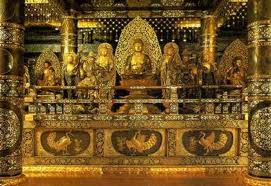Good morning!
We have now beautiful bright sunlight and the beautiful blue sky without clouds. And we have beautiful flowers at the altar and all the places. The winter air is crisp and clear; it felt cool and comfortable. Dogen loved plum flowers, which bloom in the chilly air, thus giving strong scent – severe climates strengthening stronger characters. We are children of environment and fosterers of it.
Last night I ordered a disc titled Zen, produced in Japan a few years ago, which tells about the life of Dogen. It is now available with English subtitles. So, it will be available for you to watch soon. Eight years before his birth in 1200, the Kamakura Shogunate government opened in Kamakura, far north of the old capital in Kyoto in a fresh environment and ethos.
It was a time of battles and bloodshed and of shifting rulers, from nobles to warriors. Turbulence and turmoil was occurring all over Japan. But in the northern part of Japan, a hundred miles north of Fukushima, Fujiwara Culture was blooming under the Fujiwara clan’s governance, creating a century of peace and prosperity before Dogen’s time.
Recently NHK featured the golden hall (金堂) of Chu-son-ji (中尊寺:Respecting Middle: Neutrality) Temple, with its Buddha statues. It was registered as a World Heritage site last year. It represents the Buddhist Pure-land (浄土: jôdo), or Blissfulness (Sukhavatî) of Amida (阿弥陀:Amita-âyus: Limitless Life or Amita-âbha: Limitless Light).
Every hundred yards along the several hundred miles of the Great Road leading to the golden hall, there are kasa-sotôbas (傘卒塔婆:umbrella stûpa: covered towers), so that people can directly approach and appreciate the golden building and Buddhas. More temples were added by generations of the Fujiwara family so that the people could experience the Pure-land, or Blissfulness.
Several centuries before this, Prince Regent Shotoku compiled the world first Constitution of Seventeen Articles. Its first article states that harmony is deemed precious. The second recommends reverence of the Triple Treasure. The tenth mentions the reason for them, as we are all commoners (putthu-jana: pritu-jana: mass- or separately-born: prithag-jana).
Prince Shotoku established the national legal systems, institutions, the world’s first university, temples, hospitals, etc. A millennium earlier in India, King Ashoka deeply regretted his campaign against Kalinga. He resorted to and restored Buddhism, creating Dharma-inscribed stone pillars and rocks, dispatching envoys near and far, even to Syria, Macedonia, Egypt, Mongolia, etc.
These instances illustrate that mumans can become great statesmen, creating great harmony and happiness, not small politicians causing great massacres and miseries. The Buddha was predicted to become either the universal king or the greatly awakened one, to save all beings. He chose the latter to exemplify living in holy truth, peace, goodness, and beauty.
The Buddha renounced his royal life and became a mendicant ascetic (striver: samana, shramana), attaining at last unconditioned peace (nirvana) and unsurpassed awakening after six years of extreme effort and exertion. He returned to the original unity with universal truth and harmony, beyond all karmas and karmic conditions, and shared it with all beings.
Karma winds stir us all in turbulence and turbidity. Karma clouds cause rain, flooding, snow, storms, hurricanes, typhoons, tornadoes, thunderbolts, and thunderclaps. When karma winds and clouds cease, we find a beautiful, blue, clear and cool sky, windless (nir-vâna) and penetrating, pure prognosis (prajnâ: awakening: bodhi), tasting amrita (ambrosia, immortality).
There is a famous dialog between the Buddhist monk Nagasena and the Greek Bactrian (now Afghanistan) king Milinda (Manander: Menandros), representing a conversation between East and West and referred to as Milinda’s Question (Milinda-pañha). Milinda was reported to say that even a golden palace is a golden cage – to be renounced so as to live in limitless life and light.
Anyone can “come and see” this unconditioned peace and unsurpassed awakening, “good in the beginning, in the middle, and in the end” for all always, if only one has the actual aspiration and action, as this beautiful blue sky and this beautiful bright sunlight shining on all things, without winds and completely cloudless. Here and now is the topos et tempo.
2/12/12


Kondo (Golden Hall) or Konjikido (Golden-colored Hall) Photo by NHK
